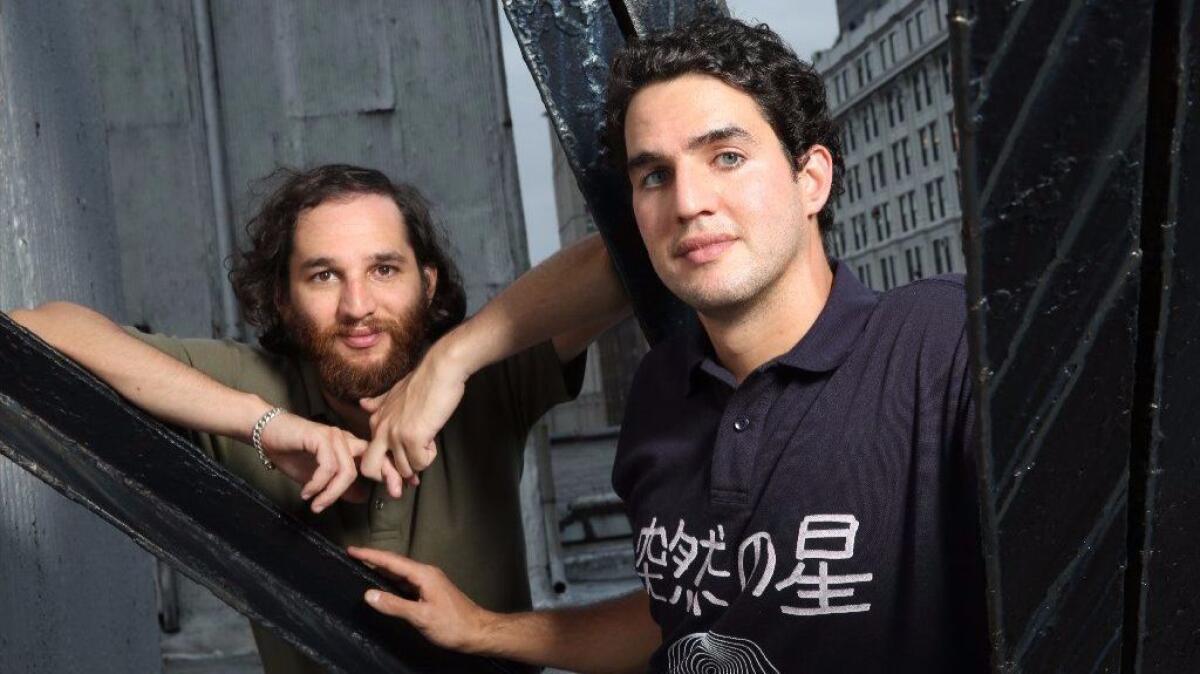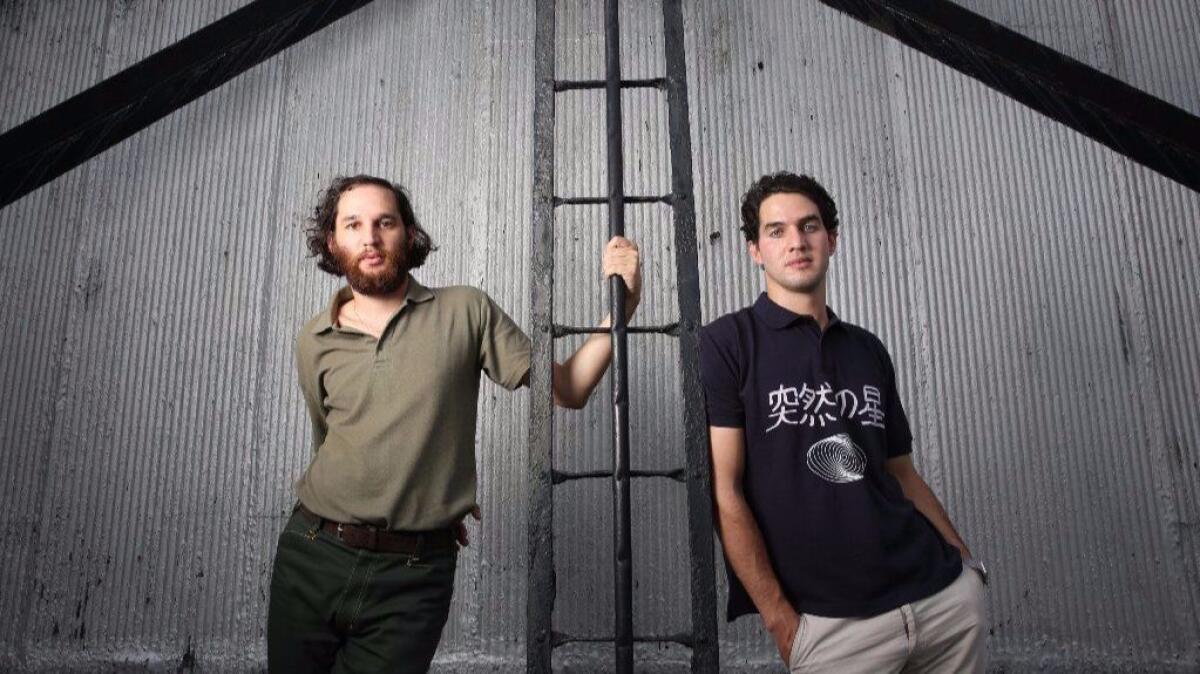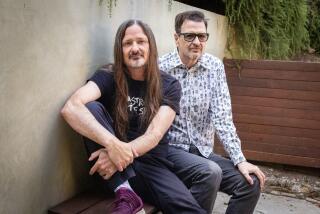Safdie brothers bring a New York flavor to breakout thriller ‘Good Time’

The New York City borough of Queens has given the world an unusual amount of larger-than-life figures: John McEnroe, 50 Cent, Howard Stern, Cyndi Lauper and, oh yes, the current White House occupant.
On a recent afternoon, two lesser-known Queens natives, the independent filmmakers Josh and Benny Safdie, were walking through their childhood neighborhood making a persistent if inadvertent case for that canon.
“You seemed to be the victim of a lot of attempted kidnappings as a child, Benny,” said Josh, 33, hirsute and mischief-making.
“That time in the arcade the guy blocked the door and asked if I wanted free tokens?” recalled Benny, 31, polite but quietly eccentric. “That was scary.”
“You got out just in time.”
“Hey, remember the pass-out game?”
“Where we would just choke each other until we passed out? Of course.”
Very colorful, and possibly even accurate, descriptions of their pasts come standard for the Safdies. The brothers spin stories of latchkey-kid adventures at local video stores and on wrestling-filled school buses in this ethnically diverse slice of outer borough New York; the most telling thing that could be noted of the duo is that, had they not already been making them, someone might have come along and said they were perfect for a Safdie brothers movie.
Fixtures of the festival world, the directors have long relied on so-called street casting and gritty observation to make acclaimed neo-realism pieces like “Daddy Longlegs” and “Heaven Knows What.” Now the brothers — Josh usually writes, Benny often edits and acts, they both direct — are set to become much more broadly known thanks to “Good Time,” a character-based thriller that A24 will release this weekend after its auspicious Cannes competition debut in May.
The film has Robert Pattinson playing Connie Nikas. A Queens hustler, Connie tries to pull off a bank robbery with his mentally challenged brother Nik (Benny Safdie), only to find Nik thrown in jail when the plan blows up. Much of the movie takes place over the course of just several hours as Connie — brooding star Pattinson is unrecognizable in street-jiving mode — schemes his way into increasingly tense situations to redeem his sibling. The bullet-train of a movie plows through the New York night, barely stopping en route to its destination of Sidney Lumet homage.
But it would be a mistake to compare the Safdies to the latest NYU or USC upstarts paying compliment to a master. Coming from modest means and a broken home, the brothers are autodidacts for whom real-life experience and career advancement are impossibly entwined. After a childhood spent shuffling between their capricious father and asocial mother, they clawed their way into Boston University. While there, they began making movies about such figures as a local gas-station attendant — then became good friends with them.
At a time when breaking out as a young filmmaker is often about the right contacts and a hundred grand in tuition, the Safdies are a throwback to when it was more about shoe leather and chutzpah.
“I remember when this friend of mine moved to (upper-class) Great Neck and he ended up living next to Whitey Ford,” Josh recalled in one tale of youthful derring-do.
“Oh, the emblem story,” Benny nodded knowingly.
“And we started ripping emblems off these fancy cars,” Josh said. “We didn’t know what we’d do with them — they were these great emblems from the hoods of Mercedes and other high-end cars. We brought them to Whitey. But he wouldn’t buy them.”
“No one would buy them.”
“We buried them in the backyard,” Josh said.
A lot of times I’m like, ‘I know that’s not true! I was there and no one said that.’
— Ava Safdie

No baseball Hall of Famer could match the impact of their father. Alberto Safdie is a Peter Pan-ish dilettante whose appetite for wild and child-inappropriate experiences was matched only by his inability to find steady work. The elder Safdie, himself just in his 20s when the uber-close brothers were young, would do things like leave his sons in the house to go fishing out on Long Island. Or, better, take them with him.
“We slept in the car while he was fishing,” Josh said.
“Did the cops ever notice?” Benny mused.
(As with many of their stories, this one should be taken with a grain of salt. “A lot of times I’m like, ‘I know that’s not true! I was there and no one said that,’” said Ava Safdie, laughing, in an interview later. “They’re just natural storytellers.” Ava Safdie is married to Benny; they have an infant son. Her life is never boring.)
The brothers pointed to their childhood apartment, a small unit in one of a warren of six-story brick buildings found in farther-flung parts of the city. They grew up in the non-upscale part of Forest Hills, a confusing den of streets many New Yorkers know primarily as the place they pass on the way to John F. Kennedy airport. Incidentally, this is not far from where Bob and Harvey Weinstein grew up.
“He had these friends,” Benny said of Alberto Safdie.
“There was this guy who always went to a tanning salon; this big, super wide guy who wore a bikini.”
“In the middle of winter,” Benny added.
“And he had a red Corvette and was sleeping with everyone and everything,” Josh said.
Josh paused reflectively. “It was not necessarily the most healthy environment to grow up in.”
Cannes 2017: ‘Good Time’ shakes up a modern festival by returning to the 1970s »
At Cannes, Alberto Safdie showed up uninvited and, in a LaVar Ball-ish turn, started dropping his sons’ names, in French, to get into fancy parties. “It was like — what are you doing?” Josh recalled. “But it worked and no one seemed to mind, so in the end we were fine with it,” said Benny. (The brothers come from a Syrian Jewish background, though they are outsiders in that hermetic New York community. They say they are distantly related to the architect Moshe Safdie.)
Filmmaking was in fact important to Alberto Safdie, who would frequently take his kids to serious if eyebrow-raising cinema; he’s the dad you see at a midnight showing of a Quentin Tarantino movie with his 9-year-old. The elder Safdie also always had a video camera in his hand, often provoking his sons for the sake of a shot. “We’d be sleeping and he would wake one of us up and say, ‘Fight with your brother,’ just to get it on camera,” Josh said of their “Glass Castle”-style upbringing, which was the inspiration for “Daddy Longlegs.”
“It was really annoying.”
“But also formative.”
Alberto Safdie’s early experiences hustling in NY’s famed Diamond District, and his tall tales from same, have directly informed the brothers’ jewel-world film “Uncut Gems,” a cinematic white whale they have been trying to make for years. (It appears to finally be happening, with a producing boost from Martin Scorsese, in the coming months.)
Pattinson in fact might’ve initially been in that movie. The “Twilight” star had contacted the Safdies hoping to work with them off nothing more than a promotional photo for “Heaven Knows What,” a 2014 quasi-verite heroin-world drama. He found his instincts validated as he began to talk to them.
“I think they’re just so into colloquial detail and these mini-subcultures,” Pattinson said. “It doesn’t feel like people who sat down to write a script for the sake of it, or so they can be accepted at a café by their hipster friends in Brooklyn. There’s a different purpose involved.”
Alas, there was no obvious part for Pattinson in “Gems,” so the Safdies began writing “Good Time” for him, using their uncommon process of conceiving of characters rather than constructing scenes. Jennifer Jason Leigh, who stars as Connie’s unhinged love interest, says when she was initially courted for the part she received no script — just nearly 10 pages of character description.
The New York melting pot has a soup quality, and you’ll always be able to find protein in the soup
— Josh Safdie
It’s tempting to see the Connie character as an on-screen avatar of the Safdies’ own hustle, and the brotherly relationship as representing their own fraternal bond. But they said they didn’t make the movie for such personal reasons. It was more a desire to capture the off-kilter types, the underclass and the forgotten, in the city they’ve long called home.
“There are a lot more rich people here now but lives are still being lived; characters are everywhere. The New York melting pot has a soup quality, and you’ll always be able to find protein in the soup,” Josh said, as he and Benny stood in front of the office of a bail bondsman they used for research and locational purposes.
“Someone invites me to see Jay Z performing for 50 people, I’m not interested in that, because I know exactly what that experience will be like. I’d much rather get invited to a barbecue in Yonkers or an Upper East Side meeting of fantasy-sports obsessives.”
Said the screenwriter Ronald Bronstein of their character-collection: “These are guys, Josh in particular, who are just a magnet for those wacked-out coincidences and serendipitous happenings. He can’t move five inches through life without attracting a lunatic experience.” Bronstein would know. A 45-ish movie-theater projectionist who directed the cult movie “Frownland,” he somehow ended up becoming their go-to writing partner.
Also a key part of the Safdiesphere is Buddy Duress, a former junkie who has done hard time. “I was locked up when Josh and Benny came up with [‘Good Time’],” Duress said.
Actually, Duress was locked up right after they told their last story, “Heaven Knows What,” which he starred in. There was a warrant out for him while they were shooting. They finished, and Duress was arrested the next day.
“Heaven” grew out of an encounter the Safdies had with then-homeless drug user Arielle Holmes; they paid her to write her experiences and then turned it into a movie with her in it. The filmmakers used a similar approach for “Good Time,” asking Duress to write a journal about his time at Rikers Island, then incorporating it into the script.
“I think it would get a little dicey for him in prison because it was like, ‘Why is this guy writing all the time?’” said Josh. He visited Duress regularly, often bringing him books.
The filmmaker would return to jail other times, sometimes with Pattinson, to do research during pre-production. In the middle of the “Good Time” shoot he ended up at a precinct for an incident he sketchily described as involving a borrowed car, a suspended license and trunk contraband. (Ava Safdie said she knows at least the precinct part is true.) By comparison, Benny Safdie’s gonzo adventures, such as getting involved in the boxing world as both spectator and participant after researching an earlier character, seem bourgeois.
There’s room to question the Safdies’ methods. Is this all a sincere desire to learn about other types of people or a fetishizing pose? Genuine research or naked cultural tourism?
The brothers insist on good intentions. “We love casting movies — it’s an excuse to have new and original friends. But we also think it’s important to get these stories out there,” Josh said.
“Weird characters are always just orbiting around,” Benny said. “We really don’t know how they find us.”
See the most-read stories in Entertainment this hour »
Twitter: @ZeitchikLAT
More to Read
Only good movies
Get the Indie Focus newsletter, Mark Olsen's weekly guide to the world of cinema.
You may occasionally receive promotional content from the Los Angeles Times.











